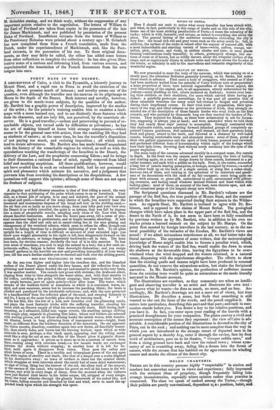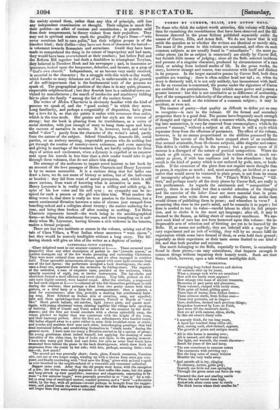HELEN CHARTER'S.
THERE are in this country persons highly "respectable" in station and conduct but somewhat narrow in views and experience; fully impressed with the strictest ideas of propriety, though frequently falling into strange inconsistencies, especially where opinion rather than practice is concerned. The class we speak of ranked among the Tories,—though their polities are purely conventional, dependent ui 01 position, habit, and
the society around them, rather than any idea of principle, still less any independent examination or thought. Their religion is much like their politics—an affair of custom and constitution ; in practice mild from their temperament, in theory violent from their prejudices. They may not in spiritual matters reach the gentility of Pope's Dean—" who never mentions hell to ears polite," but their religion proper is of the blandest kind ; their dislike—they have not force of character for hatred— is vehement towards Romanists and sectarians. Could they have been made to comprehend the thing in its extent of impropriety and bad taste, they would have been overwhelmed at their conduct; but before Peel and the Reform Bill together had dealt a deathblow to triumphant Toryism, they believed in Theodore Hook and his newspaper ; and, in innocence or ignorance, looked upon the lampooner, defaulter, and farceur, as a prop of "God's own church. Independence, or an income very easily received, is essential to the character ; for a struggle with this work-a-day world, which knocks so many delusions out of us, is unfavourable to the growth of the self-importance that is the fundamental trait of the persons we speak of. The geographical position of the class is in any quiet, pleasant, respectable neighbourhood ; but they flourish best in a cathedral town un- visited by manufactures ; the march of mechanics and machinery bidding fair to place the family " among the list of the extinct forms."
The writer of Helen Charter-is is obviously familiar with the kind of persons we speak of, and the " good society " in which they move. Long familiarity, and perhaps a congeniality of disposition, have given her a love for it, so that she paints it rather with reverence than satire, which is the true mode. Her genius and her style are the reverse of strong: but the book is pleasing from its truthfulness, as a series of social sketches, with just enough of story to bang them upon and keep the current of narrative in motion. It is, however, level, and what is called " slow "; partly from the character of the writer's mind, partly from the nature of the subject. School friendships, domestic life, social parties, or an archery meeting, respectable persons who do nothing but get through the routine of country-town existence, and even marrying and giving in marriage of the tommon kind, are hardly subjects for these days of action and excitement, when a dynasty is expelled or an emperor sent upon his travels in less time than a slow reader would take to get through three volumes, that do not allure him along.
The attempt of the authoress to impart novel interest to her book by an account of the love passages of Helen Charteris and Henry Leycester is by no means successful. It is a curious thing that few ladies can draw a hero, we do not mean of history or action, but of the ball-room or boudoir : they fail from want of moral perception, and, which is still more curious, from want of knowing what is attractive in men. Mr. Henry Leyeester is in reality nothing but a trifling and selfish prig, in spite of his low voice and his soft eyes : no sympathy can be in- aspired for such a person or the girl who likes him. What renders the thing worse is, that there is really no true passion in the business, but a secret sentimental flirtation between a miss of sixteen just escaped from boarding-school and a collegian about twenty ; the matter enduring for a year, and being-then broken off after coming to nothing. Yet Helen Charteria represents herself—the work being in the autobiographical form—as feeling this attachment for years, and then trampling on it sud- denly when Mr. Leycester, having become a rich widower in the interim, makes a formal proposal.
There are but two incidents or scenes in the volume, arising out of the tale of Clara Villars, a West Indian whose ancestors " were slaves "; but they would be scarcely intelligible without a long story. The fol- lowing sketch will give an idea of the writer as a depicter of society.
CATHEDRAL-TOWN PARTIES.
Clary delighted most in our amateur concerts at L---. These occurred more -frequently than any other description of parties in the "juvenile season," as London managers say of the few weeks preceding and succeeding Christmas. They were more rational than mere dances, and we often managed to combine both. These agreeable amusements always opened with some light overture from one of the last operas: the performers occupied a back drawiugroom, the audi- ence a front one, separated from the orchestra by folding-doors. The organist of the cathedral, a man of exquisite taste, presided at the orchestra, which usually consisted of eight, ten, or twelve instruments. The lay-clerks and choristers formed a most efficient and sweet chorus. Tiny bills, printed on deli- cate satin highly scented, were handed round. After the overture, a song—and we had such singers at L—!—silenced all who felt themselves privileged to talk during the overture; then perhaps a duet from two pretty sisters with their guitars, or a dital harp or a harp-lute accompaniment; then a quintet, a treat for connoisseurs; after this, probably a dashing but gentlemanly hunt- ing song. Next followed an Italian aria or cavativa, sung, not squalled; here and there sprinklings from the old masters, Purcell or Haydn or "such like." Short gentle ballads 1 old catches, light joyous glees, and quaint mad- , with young choriaters voices chiming together like village bells speaking of festivity. Bits of Corelli and Viotti asked for at the moment by the Arch- deacon; and the first act would conclude with a chorus splendidly sung, the voices pitched no higher than was consistent with the height of the room, and their harmony perfect. After the first act, refreshments were handed round. Old ladies slipped away to a quiet robber in some little breakfast-room or study; and youths and maidens drew near each other, interchanging greetings that had been restrained before, and establishing themselves in "shady nooks " during the move. I have seen too many a flirtation carried on by a species of proxy; young gentleman silent indeed himself,. but applying the meaning of some love-ditty of the olden time, by dint of looks and sighs, to the passing moment. I have seen many girl blush and cast down her eyes as some fond words have emanated from behind the piano in the back-drawingroom, which drew forth an expression from the youth by her side; with him, perhaps, meaning little—with her—oh, how much I The second act was generally short: duets, glees, French romances, Venetian airs, and one or two longer songs, winding up with a chorus from some gay com- poser, and finally concluding with " God Gave the King," given with as loyal a spirit as ever breathed in the neighbourhood of a venerable and venerated cathedral. Supper came next. Alta- that the old people went home, with the exception i of a few; the violins were safely deposited in their coffin-like cases, but the pipe) and harp struck up duet quadrilles; mammas and chaperones, consenting to ht- main "a few minutes longer," were generally prevailed on to "cut in" for a rub- ber; a snug tray of escalloped oysters, mashed potatoes, and a "devil "—a favourite relish, by the way, with all persons—would perhaps be brought from the supper.. room, and placed beside the whist-table; and thus the elder folks were kept amu- sed longer than they anticipated or intended.



























 Previous page
Previous page